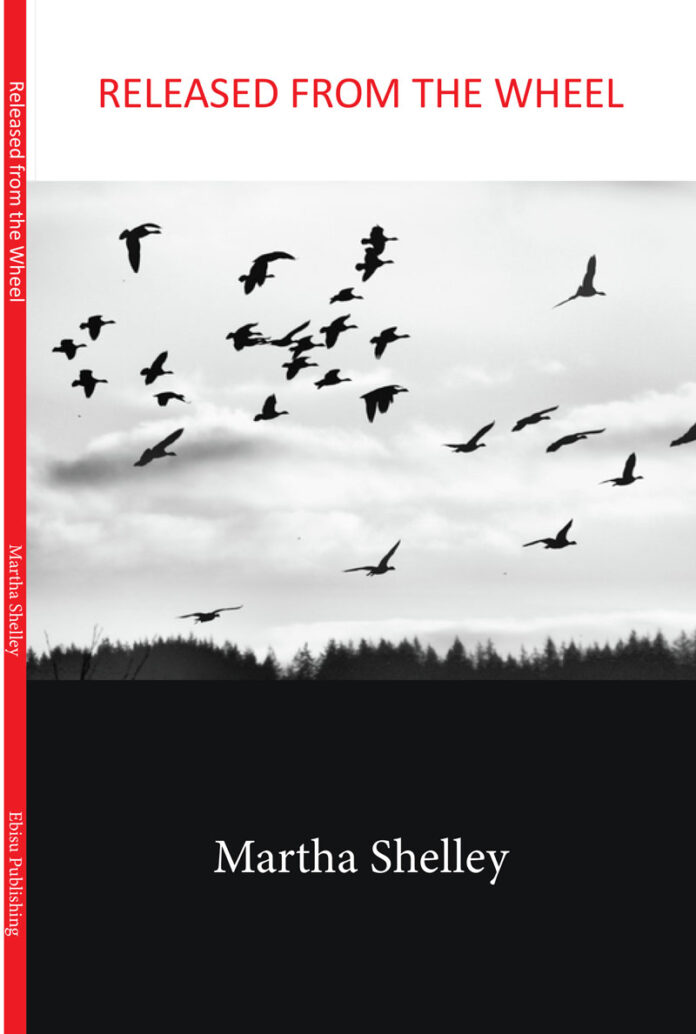“Like all great poets, Shelley’s poems are about life and death—how imminent and inevitable death really is and therefore, how precious, how amazing, is each moment of our lives. She covers it all, from insect life to the stars—to the very galaxies, but she also covers politics, heroism, religion, cramped airplanes, and childhood memories of summers at the beach. “Released from the Wheel” is a pleasure and a wonder to read.” –Phyllis Chesler
Martha Shelley has been an LGBTQ activist for over 50 years, and she has been writing poetry all through that time. Shelley, who was an early member of both Gay Liberation Front and Lavender Menace, was kind enough to answer some questions about her poetry, her activism, and her latest book.
When did you first start writing poetry?
I started writing poetry as a child.
What were your first poems about?
I have no recollection of what those childish poems were about–the earliest ones I can remember were pretty amateur ones in a creative writing class in high school, and after that slushy love poems to my first woman lover.
What was your first published poem?
My first published poems were in the lesbian magazine, The Ladder. I don’t remember which was the very first.
You’ve been both an activist and a poet for a very long time. Does your activism impact what you write about in your poetry? And does your poetry impact your activism or how you view your activism?
My activism inspires my poetry, or at least the political poems–both the serious ones and also humorous ones like “Pre-Flight Instructions.” I can’t say that the poetry inspires my activism, but I hope that some of it inspires other people to see the world in a different way and then to take action.
A lot of your poems seem to have a layer of fun to them, either in the prose/syntax or in the topics you write about, but then you also tackle very serious topics in some poems. Was it important to you to have a balance of both serious and more lighthearted poems in the book?
When I put this collection together, I wasn’t thinking about balancing the serious with the lighthearted. I just included the ones that I thought were good enough for publication, and that other people I knew liked and and responded to.
Is there a person, place, or topic that you find yourself continually returning to in your poetry? If so, why do you revisit it?
I may revisit certain topics, but it isn’t a conscious decision. I write about whatever moves me at the moment.
You wrote for and helped put together the GLF newsletter Come Out!, which also published some of your poetry. What was it like getting to publish your writing in such an unapologetically LGBTQ space? What did you feel when your first poem in Come Out! was out in the world?
Since I’d already published lesbian poetry (and essays) in The Ladder, having my work appear in Come Out! wasn’t a huge step into the public domain. From 1967-1969 I was a member of the Daughters of Bilitis and, starting early in 1968, I became the public spokesperson for the New York chapter. I had already identified publicly as a lesbian on radio and TV.
You were also involved with the Women’s Press Collective, which published authors like Judy Grahn and Willyce Kim. How was that experience, getting to work with other groundbreaking lesbian writers?
In 1972 I was invited to produce a lesbian program for WBAI-FM in New York. The show was called Lesbian Nation, and I put Judy Grahn, Audre Lorde, and other lesbian writers on the air. it ran until 1974, when I moved to Oakland and began working with the Women’s Press Collective. They published my first poetry collection, Crossing the DMZ. What was it like? I believed at the time that we were changing the world, making a women’s revolution, and I was on fire–just as I had been on fire with the Gay Liberation Front.
What do you hope people feel when they read “Released from the Wheel?”
I hope people who read Released from the Wheel feel different emotions–laugh at funny poems, weep over sad ones, and so on.
If someone were to read a single poem of yours, which one would you want it to be?
How can I answer that question? It’s like asking a mother which of her children she loves most.
“Released from the Wheel” is available at ebisupublications.com/.
